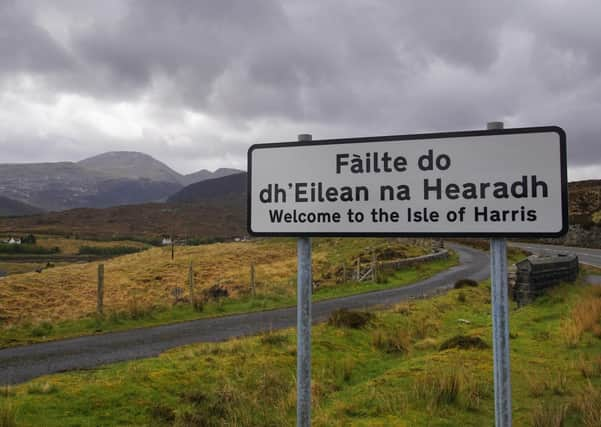Gaelic: How Scotland can save this language – Brian Wilson


Contrary to this week’s headlines, Gaelic will be alive and kicking ten years from now. And 20. And 50. There will be Gaelic academics, Gaelic learners, Gaelic singers, Gaelic broadcasters. The question raised by newly published research is whether there will be Gaelic-speaking communities, by even the loosest definition, to sing and broadcast to.
Current projections are not encouraging which should surprise nobody. The value of the research is to validate the obvious and encourage some corrective actions.
Advertisement
Hide AdAdvertisement
Hide AdOr does anybody really care? There is a hard anti-Gaelic core in Scotland, which I have always found sad and unfathomable. More generally, there is benign disinterest which wishes the language no harm but scarcely sees it as a priority.
Even among Gaelic-speakers, many do not regard it as a cause. But then why should they? Language is as natural as breathing. For most, it does not need legislation to support its existence or use.
The problem for all minority languages is that natural selection in a global village will wipe them out, just like a species too weak to defend itself. So they need protection, special measures, legislation to give them a fighting chance.
Gaelic is no different. It will live or die in Scotland. We can make a good job of creating that fighting chance or a bad one. At present, the report card is not promising.
Official status was always going to be a two-edged sword – impossible to argue against but potentially worse than useless.
By concentrating scarce resources on tokens and targets, boxes would be ticked with urgent realities ignored.
Its main outcome was to create a Government quango which promptly set about hoovering up organisations which hitherto had some degree of vibrant independence. Now the only “voice of Gaelic” is itself a government agency – an impossible conflict of interests.
In 2010, a target was set of 4,000 entering Gaelic-medium education within a decade. The actual figure is nearer 500. It is a familiar story – unrealistic targets, headlines, then silence. The issue of secondary teachers has never been addressed, so that many who enter the system are subsequently failed by it.
Advertisement
Hide AdAdvertisement
Hide AdHowever, there is a more fundamental issue. Gaelic is declining where it still had strength because these communities themselves are changing so rapidly. If there are no people, there will be no language.
I agree with the recommendation that a network of community groups should be created to encourage practical measures which reinforce language use.
That grassroots input is at present entirely absent. There is minimal support for parents.
However, the bigger challenge will still be demographic. For example, the Western Isles shows population decline in 30 out of 36 data areas since 2011. Fifteen per cent in Eriskay/South Boisdale, 13 per cent in Ness... That is where the language is going.
Ireland recognised long ago that issues are inter-linked by creating a Department of the Gaeltacht with economic and social, as well as linguistic, remits. I would not recommend replicating that because the distinction between “Gaelic” and “non-Gaelic” communities is invidious. But the principle is right.
Many parts of the Scottish periphery share the same issues – lack of housing, lack of employment, declining services, pressure for holiday homes, breakdown of crofting regulation which is now an empty shell...
From an Edinburgh perspective, there is no recognition of the “micro” issues which affect these picture postcard places. Half a dozen Scottish bureaucracies solemnly administer their decline from a safe distance and Gaelic is just one of the resultant casualties.
There are 28 ministers in the Scottish Government. Heaven knows what the poor civil servants find to put in some of their boxes each night to convince them they are doing something useful.
Advertisement
Hide AdAdvertisement
Hide AdSurely there is room for a Minister for the Periphery with powers to break down bureaucratic silos and breathe new life into these places.
Without such intervention, there will be no Gaelic-speaking communities largely because there will be no viable communities where Gaels once spoke.
This should be a plea from the Scottish periphery, rather than for Gaelic alone.
A message from the Editor:
Thank you for reading this article on our website. While I have your attention, I also have an important request to make of you.
With the coronavirus lockdown having a major impact on many of our advertisers - and consequently the revenue we receive - we are more reliant than ever on you taking out a digital subscription.
Subscribe to scotsman.com and enjoy unlimited access to Scottish news and information online and on our app. With a digital subscription, you can read more than 5 articles, see fewer ads, enjoy faster load times, and get access to exclusive newsletters and content. Visit www.scotsman.com/subscriptions now to sign up.
Our journalism costs money and we rely on advertising, print and digital revenues to help to support them. By supporting us, we are able to support you in providing trusted, fact-checked content for this website.
Joy Yates
Editorial Director
Comments
Want to join the conversation? Please or to comment on this article.